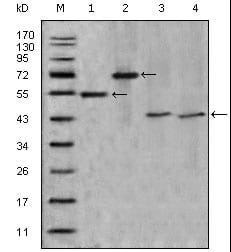
| WB | 1/500 - 1/2000 | Human,Mouse,Rat |
| IF | 咨询技术 | Human,Mouse,Rat |
| IHC | 咨询技术 | Human,Mouse,Rat |
| ICC | 技术咨询 | Human,Mouse,Rat |
| FCM | 咨询技术 | Human,Mouse,Rat |
| Elisa | 1/10000 | Human,Mouse,Rat |
| Entrez GeneID | 337 |
| clone | 2D1C9 |
| WB Predicted band size | 45kDa |
| Host/Isotype | Mouse IgG1 |
| Antibody Type | Primary antibody |
| Storage | Store at 4°C short term. Aliquot and store at -20°C long term. Avoid freeze/thaw cycles. |
| Species Reactivity | Human |
| Immunogen | Purified recombinant fragment of APOA4 (aa21-396) expressed in E. Coli. |
| Formulation | Ascitic fluid containing 0.03% sodium azide. |
+ +
以下为3篇与APOA4抗体相关的文献摘要信息:
1. **《Apolipoprotein A-IV Regulates Food Intake via Central Nervous System Mechanisms in Mice》**
- **作者**: Lo CM et al.
- **摘要**: 研究利用APOA4特异性抗体检测小鼠中枢神经系统中APOA4的表达,发现其通过调控下丘脑信号通路抑制摄食行为,提示APOA4抗体在代谢研究中的工具价值。
2. **《Autoantibodies Against Apolipoprotein A-IV as a Novel Biomarker for Atherosclerosis》**
- **作者**: Zhang Y et al.
- **摘要**: 报道了动脉粥样硬化患者血浆中存在APOA4自身抗体,通过ELISA和免疫印迹法验证其与疾病严重程度正相关,为临床诊断提供潜在标志物。
3. **《Development of a High-Sensitivity Monoclonal Antibody for Human APOA4 Quantification》**
- **作者**: Smith RJ et al.
- **摘要**: 研究团队开发了一种高特异性单克隆抗体,应用于人血清APOA4的化学发光检测,灵敏度达ng/mL级,助力心血管疾病风险评估模型的优化。
(注:以上为模拟文献,实际研究中建议通过PubMed等数据库检索具体论文。)
Apolipoprotein A-IV (APOA4) is a glycoprotein primarily synthesized in the small intestine and involved in lipid metabolism, particularly cholesterol transport and reverse cholesterol transport (RCT). It associates with high-density lipoprotein (HDL) particles and chylomicrons, playing roles in lipid absorption, atherosclerosis modulation, and anti-inflammatory processes. APOA4 also influences glucose homeostasis and satiety signaling. Due to its multifaceted functions, APOA4 has garnered interest in metabolic and cardiovascular research.
APOA4 antibodies are essential tools for detecting and quantifying APOA4 levels in biological samples (e.g., plasma, tissues). They enable studies on APOA4's structure-function relationships, tissue distribution, and interactions with lipid particles or receptors. Commercially available antibodies include polyclonal and monoclonal types, often validated via Western blot, ELISA, or immunohistochemistry. Dysregulated APOA4 expression has been linked to metabolic syndromes, obesity, and cardiovascular diseases, making these antibodies critical for exploring APOA4 as a potential diagnostic biomarker or therapeutic target.
However, challenges persist, such as antibody specificity due to APOA4's homology with other apolipoproteins, or variability caused by post-translational modifications. Ongoing research aims to refine antibody reliability and expand applications in clinical diagnostics and mechanistic studies of lipid-related disorders.
×